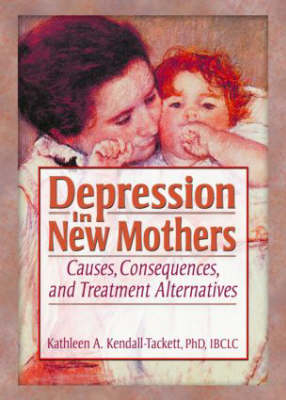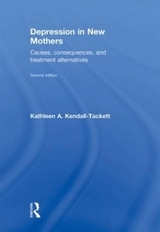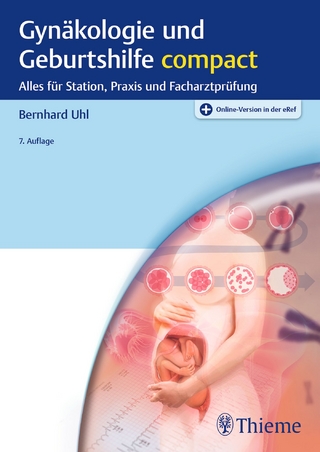
Depression in New Mothers
Haworth Press Inc (Verlag)
978-0-7890-1838-0 (ISBN)
- Titel erscheint in neuer Auflage
- Artikel merken
This book, which completely updates Kathleen Kendall-Tackett’s 1993 classic text Postpartum Depression, provides you with a comprehensive approach to treating postpartum depression in an easy-to-use format, including treatment options that are safe for use with breastfeeding mothers. Addressing fatigue, pain, negative birth experiences, infant characteristics, and psychosocial factors, Depression in New Mothers: Causes, Consequences, and Treatment Alternatives presents a vital, cross-cultural view of depression in new mothers that will prove invaluable in treating the mothers who come to you for help.
Depression in New Mothers: Causes, Consequences, and Treatment Alternatives dispels the myths that hinder effective treatment and presents up-to-date information on:
the impact of maternal depression on the health of the mother, as well as the health and well-being of the infant
conditions that may co-occur with postpartum depression, including anxiety disorders (obsessive compulsive disorder), posttraumatic stress disorder, eating disorders, and substance abuse
alternative treatments, including diet, exercise, and omega-3s
the role of psychotherapy and community-based programs
the use of herbs and psychotropic medications to combat postpartum depression
the impact of various treatments on breastfeedingwith treatment options that are safe for women who continue breastfeeding through treatment
From the Foreword, by Jane Honikman, Founding Director of Postpartum Support International, Santa Barbara, California:Dr. Kathleen Kendall-Tackett has been a pioneer educator in the field of maternal mental health since her first book, Postpartum Depression, was published in 1993. In this new volume she expands upon her knowledge of the complexities and interrelationships that exist in the field of maternal depression. Her goal is to equip her readers with the information needed to make a real difference in the lives of mothers and babies. She has achieved this goal through a systematic framework that will help you understand the topic and how to communicate effectively with postpartum mothers.
Depression in New Mothers is truly comprehensive, addressing under-investigated issues, such as negative birth experience, previously untreated trauma, and the impact of infant characteristics such as crying, sleep habits, prematurity, chronic illness, and disability. Each chapter contains summaries of thought-provoking international research studies. The information in this reader-friendly resource can add a vital perspective to advance the way health professionals todayand the health professionals of tomorrowview and treat postpartum depression.
Foreword (Jane Honikman)
Preface
Acknowledgments
Chapter 1. Depression in New Mothers: Myths versus Reality
Myths About Postpartum Depression
Assumptions About Postpartum Depression
Symptoms of Depression
Incidence
Postpartum Psychosis
Conditions Comorbid with Postpartum Depression
Conclusion
Chapter 2. Why Depression Is Harmful for Mothers and Babies
Why Depression Is Bad for Mothers
Why Depression in Mothers Is Bad for Babies
Interaction Styles of Depressed Mothers
Infanticide and Maternal Suicide
Conclusion
Chapter 3. Physiological Influences in Postpartum Depression
Fatigue and Sleep Deprivation
Immune System Function and Depression
Pain
Hormonal Influences
Cholesterol
Conclusion
Chapter 4. Negative Childbirth Experiences
Characteristics of Negative Childbirth Experiences
Negative versus Traumatic Childbirth
The Efficacy of Debriefing
Conclusion
Chapter 5. Infant Characteristics and Depression in Their Mothers
Infant Temperament
Infant Health Issues
Conclusion
Chapter 6. Psychological Risk Factors
Attributional Style
Self-Efficacy, Self-Esteem, and Expectations
Previous Psychiatric History
Violence Against Women
Loss
Conclusion
Chapter 7. Social Risk Factors
Stressful Life Events
Maternal Age
Socioeconomic Status
Maternity Leave and Employment
Social Support
Supporting the Mother-Infant Relationship
Chapter 8. Assessment of Postpartum Depression
Challenges to Assessing Postpartum Depression
Screening for Depression
Assessment Scales
Additional Factors
Conclusion
Chapter 9. Alternatives and Complementary Therapies: Diet, Supplements, and Exercise
Diet
Supplements
Exercise
Combined Modalities and Other Techniques
Conclusion
Chapter 10. Community Interventions and Psychotherapy
Community Interventions
Psychotherapy
Trauma-Focused Treatment
Conclusion
Chapter 11. Psychoactive Substances: Herbs and Antidepressants
Herbal Antidepressants
Antidepressants
Medications for Comorbid Conditions
Phases of Depression Management with Medication
Conclusion
Chapter 12. Postpartum Depression and Psychosis: One Woman’s Story
Background
The Birth Experience
The Postpartum Period
The Hospital Diary
The Psychiatric Evaluation
Analysis
Information on Past Sexual Abuse
The Road to Recovery
2003 Update
Final Thoughts
Listen to Mothers
Let Mothers Know About Factors That Might Be Influencing Their Emotional States
Offer Specific Suggestions That Can Help
Help Mothers Mobilize Support
Conclusion
References
Index
| Verlagsort | Binghamton |
|---|---|
| Sprache | englisch |
| Gewicht | 590 g |
| Themenwelt | Medizin / Pharmazie ► Medizinische Fachgebiete ► Gynäkologie / Geburtshilfe |
| Medizin / Pharmazie ► Medizinische Fachgebiete ► Psychiatrie / Psychotherapie | |
| ISBN-10 | 0-7890-1838-1 / 0789018381 |
| ISBN-13 | 978-0-7890-1838-0 / 9780789018380 |
| Zustand | Neuware |
| Informationen gemäß Produktsicherheitsverordnung (GPSR) | |
| Haben Sie eine Frage zum Produkt? |
aus dem Bereich



